Over the past 40 years, economic reforms and global trends have pushed Vietnam’s economy from one of the poorest in the world to a middle-income economy, according to the World Bank. In line with its continual and steady development, the country expects 5.5% growth in 2024, up from 5% in 2023. This expansion has put Vietnam well on its way to achieving its goal of becoming a high-income country by 2045.
WDI has managed programs in Vietnam for the last 20 years, as part of the Institute’s mission in low- and middle-income countries (LMICs). In 2004, the Institute hosted a six-week management education program for executives from Vinacomin, Vietnam’s national mining country. In 2017, MBA students from the Ross School of Business at the University of Michigan worked with Vietnam Partners LLC to develop a Center for Entrepreneurship and Innovation and a venture capital fund focused on start-ups. Another group of MBA students joined Solagron, a high-tech agricultural company that relies on solar energy to cultivate and process microalgae, in 2024 to build a market entry strategy.
“Vietnam has all the characteristics of a market perfect for WDI’s involvement,” said Amy Gillett, WDI Vice President of Education “Its economy is an innovative one. Its players want to diversify, support start-ups, and strengthen managerial skills, so it’s the ideal time for us to be there. There is massive potential.”
Over the last three years, WDI has been elevating Vietnamese business leaders’ skills through its Advanced Mini-MBA Program at the FPT School of Business & Technology (FSB). This partnership brings together educators and business leaders to expand participants’ management skills, bolster business education opportunities and encourage economic growth in the country.
“Helping countries transition from centrally planned economies to market economies is WDI to its essence,” Gillett said. “When you make that transition, you need to cultivate and rely on a new level of management skills. WDI is perfectly equipped to train business leaders in these important skills, whether it’s in Eastern Europe, Sub-Saharan Africa or Southeast Asia.”
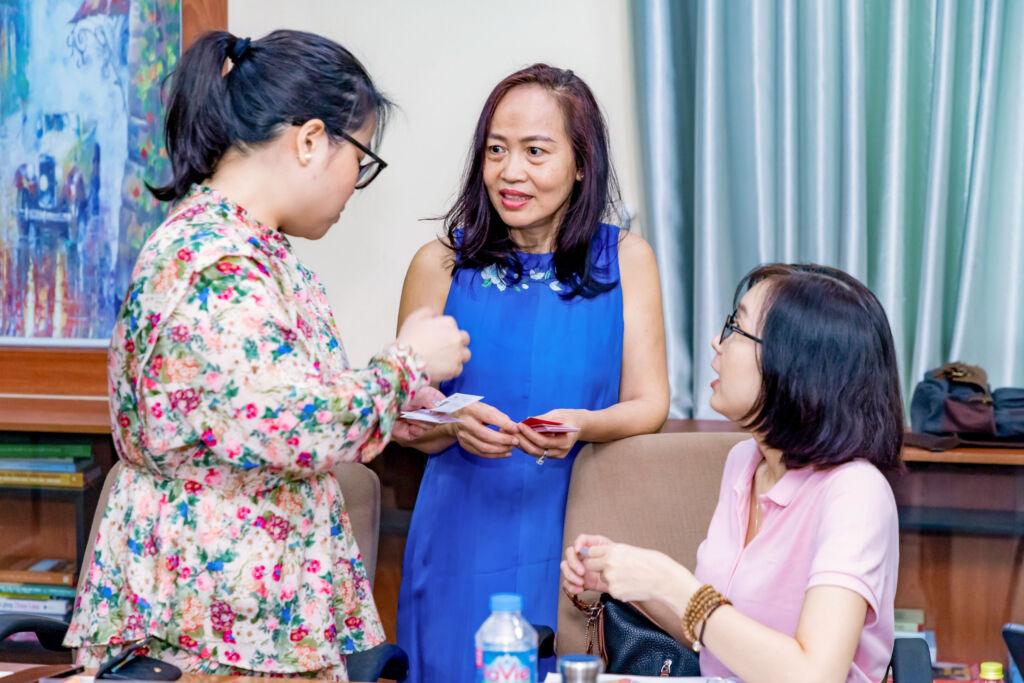
Not only has the government supported economic growth in the country through improved infrastructure and healthcare, but the nation’s businesses have pushed for inventive ways to accelerate their industries. The country is experiencing a steady increase in GDP per capita and improved infrastructure access.
“Vietnam is an interesting setting for management training because of the unique characteristics of the business environment. The high degree of government participation in the economy, for example, means that a company’s go-to-market strategy must respect this government — or, even better, leverage the government participation for competitive advantage,” said John Branch, clinical associate professor of business administration at the University of Michigan’s Ross School of Business. He teaches in the Mini MBA Program in both Vietnam and in Riga, Latvia.
The certificate program was co-developed by Gillett and David Estrada, WDI Education program administrator, specifically for the Vietnamese market. It digs into how to leverage these government relationships and requirements, and it also covers critical lessons on foundational business skills. WDI-affiliated faculty and FSB instructors teach executive students about strategy, sales management, marketing, finance, operations, entrepreneurship, leadership, negotiations, human resources and more. Through a combination of in-person and online sessions, the program pushes participants to focus on digital transformation, leadership expansion, practical decision-making and organizational-level thinking.
“The program is mutually beneficial,” said Nguyen Viet Thang, Dean of FSB. “WDI has brought us new values and perspectives, and having top WDI professors participate in teaching is a great benefit for Vietnamese students and faculty. Conversely, we hope WDI gains significant value in understanding the corporate management culture of Eastern countries in general and Southeast Asia in particular.”
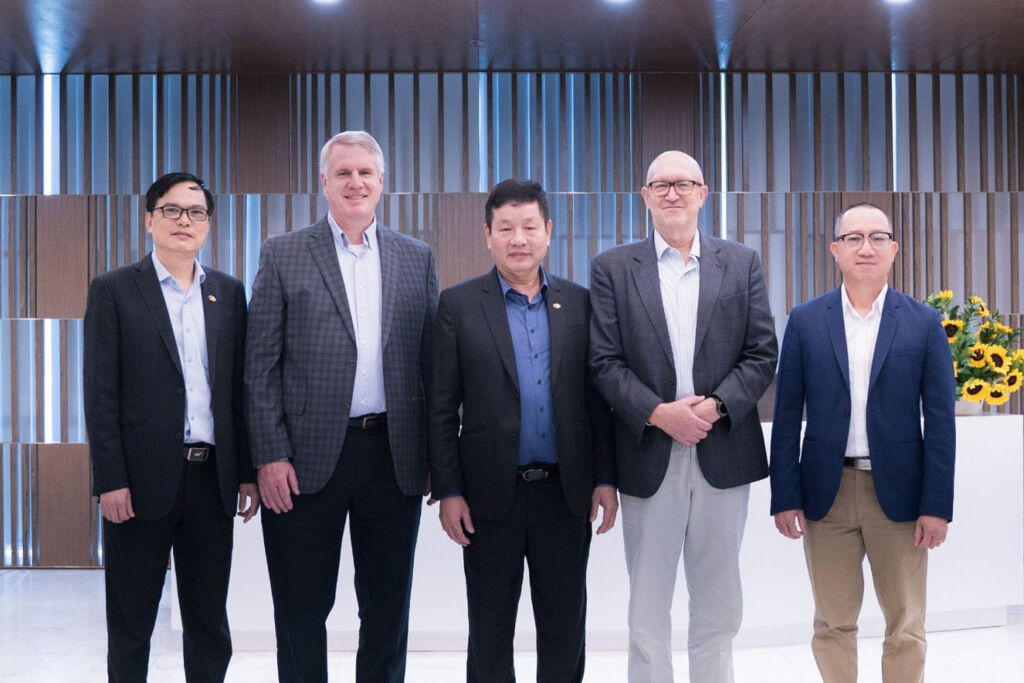
Pictured from left to right: Dr. Nguyen Viet Thang, Dean of FPT School of Business & Technology of FPT University; Paul Clyde, Former President of WDI; Dr. Truong Gia Binh, Chairman and CEO of FPT Corporation; Bradley Lalonde, Co-founder and Chairman of Vietnam Partners LLC; Ha Nguyen, Academics Head of FPT School of Business.
WDI has brought us new values and perspectives, and having top WDI professors participate in teaching is a great benefit for Vietnamese students and faculty. Conversely, we hope WDI gains significant value in understanding the corporate management culture of Eastern countries in general and Southeast Asia in particular.
– Nguyen Viet Thang, Dean of FSB
This year’s program will run from July through October 2024, and each module is deeply connected to real-world dilemmas and solutions. At the end of the program, participants complete a final group project around current management challenges they face in their own businesses. Participants are asked to consider a specific issue, analyze it, and formulate a practical solution. Groups then present their project, which includes market analysis, implementation plans and feasibility decisions, to the class. At the program’s culmination, participants receive a co-branded WDI-FSB certificate — emphasizing the deep value of these global relationships and cross-cultural educational opportunities.
“The WDI and FSB partnership is a win-win situation. It fosters knowledge exchange, expands access to valuable educational programs, and ultimately contributes to the development of a strong and globally competitive business community in Vietnam,” noted Bradley Lalonde, co-founder and chairman of Vietnam Partners LLC, in a recent business newsletter. Lalonde, a private equity and fund management expert who served as the first CEO of Citibank Vietnam, played an essential role in the development of the partnership program.
This unique FSB partnership program was created to strengthen both individual business skills and the larger economy. To achieve that goal, the curriculum is directed toward those in leadership roles – in many cases, the people driving the evolution of their industries. Participants in the program must have at least five years of management experience, and their expertise and sincerity show in their dedication to the course.
“What I admire in any learner is curiosity, and the Vietnamese learners in this program are especially curious,” Branch said. “They always ask questions. They try to dig deeper into the concept theories, and they want to see direct application to their own situations.”
For students, the program is an opportunity to learn from some of the best business faculty in the world, build a network of global business leaders and transform their own skills. For WDI, the program is a chance to bring its connections and educational prowess to a newly booming nation — an effort that aligns perfectly with its mission of unlocking the power of business to provide lasting economic and social prosperity.
“From my perspective, the partnership between WDI and FSB holds significant value for both institutions and, ultimately, for the business landscape in Vietnam,” said Lalonde.
ANN ARBOR, MI – The William Davidson Institute (WDI) at the University of Michigan is hosting a group of 12 engineering faculty from six different universities and research institutes in the state of Chihuahua, Mexico, as part of a study visit to Michigan this week. The visit is part of the Zero-Emissions Vehicle (ZEV) academic partnership implemented by WDI with support from the U.S. Mission Mexico Public Diplomacy Section.
The shift to ZEVs means educational and training institutions around the world must adapt their curricula to better respond to the evolving talent needs of the automotive industry. Educators will need to develop new courses in emerging areas, update lab equipment and facilities for hands-on training and testing, and identify new research areas, WDI research shows.
With ZEV production growing across North America and around the globe and with many new players entering the industry, preparing the workforce that will enable this transition becomes crucial. In the state of Chihuahua, Mexico, which has a robust automotive manufacturing industry, several universities are interested in integrating ZEV-related content into existing courses and creating new ones, launching new areas of research, and establishing ZEV innovation centers to propel the state toward an electric future. Partnerships are vital for educational institutions in reaching these goals.
“We recognize that the ZEV industry requires a new generation of workers with different skills and competencies,” said Fernando Alba, Undersecretary for Energy, Mining and Industry of the State of Chihuahua. “Just as we provide the talent for the traditional automotive industry, we will be well positioned to support this shift to electrification in Chihuahua, a region known for its strong manufacturing base and skilled workforce. The ZEV academic partnership and our broader engagement with WDI are helping us access world-class expertise from Michigan and develop new academic and business collaborations.”
Within academic institutions, this shift is being felt in the classrooms, in the labs, and beyond—and key to the success of new endeavors is the faculty teaching, researching, and innovating in this space.
Before arriving in Michigan, ZEV program faculty participants completed a virtual program over the course of six months, which was designed by WDI and provided an overview of Michigan’s approach to developing ZEV talent, highlighting programs and initiatives from U-M and other players across the state.
The visit is providing an immersive experience for faculty by sharing teaching and research related to ZEVs in Michigan, with the goals of deepening their knowledge and seeding future collaborations in this area. Throughout the week, the group will tour the University of Michigan’s Battery and Auto Labs, the Ford Robotics Building, Mcity, and other U-M engineering facilities. The visiting faculty also will meet with students, including teams and clubs such as the U-M Solar Car team, U-M Electric Boat, Michigan Mars Rover team, Supermileage club and Michigan Climate Ventures.
“Universities and other educational institutions working to update their existing curricula or create new programs to develop ZEV talent will need faculty with the knowledge to teach this new content, said Diana E. Páez, Senior Director, Energy & Mobility. “This means that upskilling is not limited to industry—academia too must invest in preparing educators and researchers to teach and innovate around ZEV technology.”
Beyond U-M, the group also has the opportunity to learn about ZEV training programs offered at Washtenaw Community College and to connect with faculty and experts at Macomb Community College and tour its ZEV lab. Finally, the group is connecting with ZEV startups in Detroit and visiting Newlab, a hub for entrepreneurship and mobility innovation in the city.
Capping off the study visit, the participants are completing a technical training on vehicle electrification and battery systems taught by U-M Engineering faculty and organized by Nexus at U-M Engineering, delving deeper into the most important aspects of these technologies and acquiring relevant expertise and sample lessons to incorporate in their own teaching.
Equipped with enhanced technical knowledge on these topics and with the insights gleaned from their week in Michigan, faculty participants will next develop proposals for new project ideas or collaborations within and across their universities and with interested Michigan institutions. The proposals will focus on training, research or innovation related to ZEVs.
Participating engineering faculty hail from the Universidad Autónoma de Ciudad Juárez, Universidad Autónoma de Chihuahua, Universidad Politécnica de Chihuahua, Instituto Tecnológico de Estudios Superiores de Monterrey Campus Chihuahua, Centro de Investigación en Materiales Avanzados, and Instituto Tecnológico de Ciudad Juárez.
The ZEV academic partnership builds on WDI’s ongoing collaboration with the Secretaría de Innovación y Desarrollo Económico (SIDE) and Instituto de Innovación y Competitividad (I2C) from the State of Chihuahua to help a wide range of stakeholders navigate the transition to electrification in the automotive industry.
With a growing middle class, early-stage frontier markets, enormous demographic advantages, and its ongoing digital transformation, Africa continues to grow in both economic and geopolitical importance. In “Demystifying Africa’s Risk Perception Premium,” Paul Clyde and co-authors make the case for a stronger U.S.- Africa trade and investment relationship, one that changes the narrative around doing business on the continent.
Time: 9 AM EDT / 4 PM EAT
Date: Tuesday, June 4, 2024
Location: Zoom
Incubators and accelerators play a critical role in the startup ecosystem by helping entrepreneurs become investment-ready and develop viable businesses. In this must-attend session for accelerators, incubators, entrepreneurs and their funders operating in the Global South, join us to discover how rigorous research fuels innovation in program design, supercharges operational improvements, and attracts more funding to this sector.
In this dynamic session, representatives from IKEA Foundation (Netherlands), William Davidson Institute at the University of Michigan (WDI, USA) in collaboration with Kenya Climate Innovation Center (KCIC, Kenya) and African Management Institute (AMI, Kenya) will share the following insights:
Please submit your questions in advance.
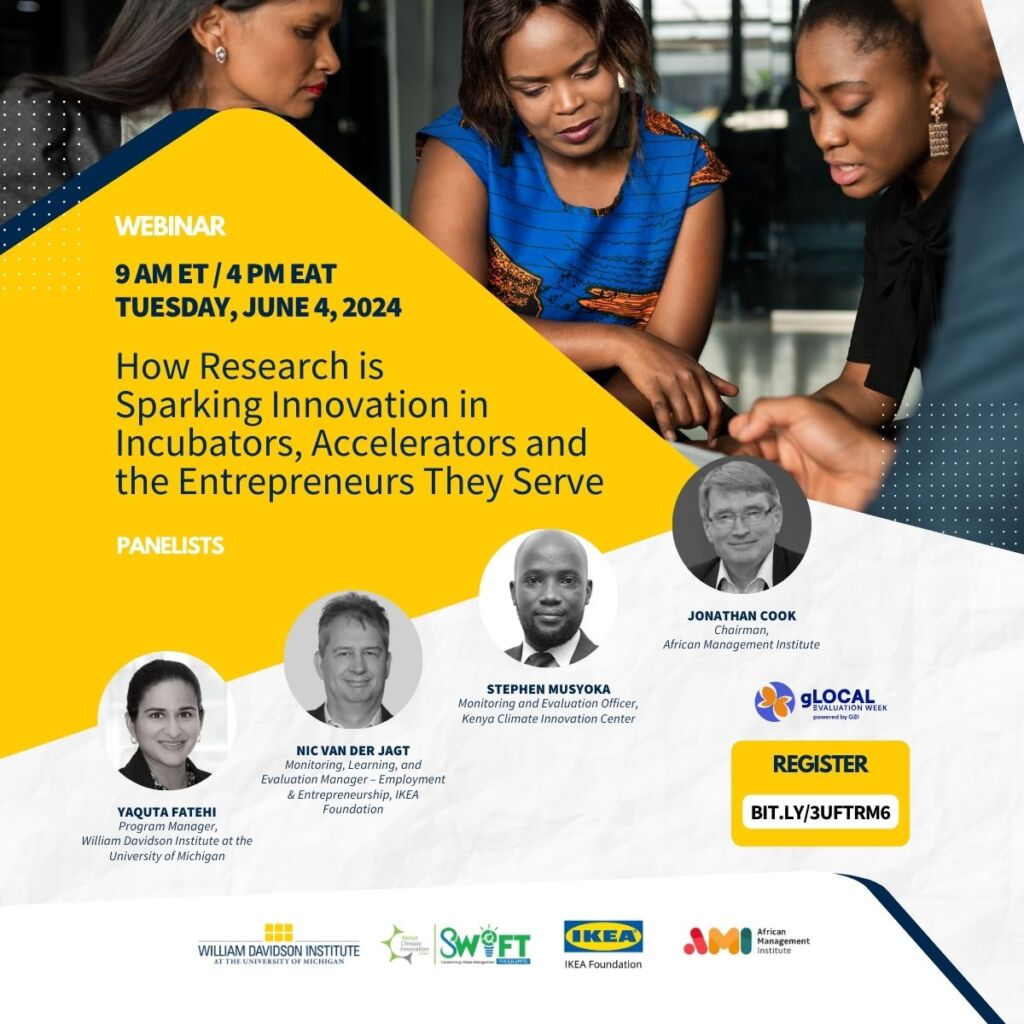
Patrice Gopo (left) and Minah Koela (right), who served as an interpreter in Cape Town for a WDI-funded project, with handbags made by local women business owners in South Africa.
Patrice Gopo knows better than most how deeply we’re all connected. Growing up in Anchorage, Alaska, the child of Jamaican immigrants, she spent a lifetime navigating the tensions of that experience. She lived for years in the Alaskan cold, surrounded by people who could never quite understand what it meant to be different in the way she was. She vacationed in Jamaica, playing with family who would never manage the complex social dynamics she did. She belonged in both places — and in neither. On top of that, her life “didn’t always align with the typical experience that Black Americans are handed in the U.S.,” she explained. This multiplicity formed her foundation and brought unavoidable questions of belonging, place and home — ones she’s been grappling with all her life.
She’s carried these questions through her Master’s degrees in business and public policy from the University of Michigan, through a global internship and an MBA project supported by the William Davidson Institute at the University of Michigan (WDI), and into her current career as an author.
Gopo grew accustomed to feeling like she belonged nowhere and everywhere all at once. Eventually, instead of seeing division in the differences, she started to find connection. She sewed these complicated layers into the fabric of her life, personally and professionally. She built a career across borders, joining cultures and communities to form her foundation. She wove together a family whose arms reach around oceans. She spent years finding ways to bring people together, lending the skills she learned as a student at the University of Michigan’s Ross School of Business to South African business women and giving voice to the experiences of cross-culture children through her writing.
With her childhood as her guide, her education at U-M as a bedrock and her passion for service as her North Star, Gopo has grown into an accomplished author. Her books cover global communities, racial identity and compassionate growth — and a fortuitous internship supported by WDI helped get her there.
Becoming a writer wasn’t a path Patrice envisioned for herself at the start of her career. She focused her first collegiate experience in science and earned a Bachelor of Science in Chemical Engineering from Carnegie Mellon University. She spent a few years working as a development engineer at Eastman Kodak Company, working on some of the company’s technology products. Although she was in a creative occupation, Gopo (then Harduar) did not feel connected to the work.
She’d inherited a need to “add something beautiful to the world,” and she was still searching for her addition. Her father was a teacher and a principal; her mother was a school nurse. Both dedicated their lives to helping others thrive, and it was important to Gopo to find a path that did the same. “There was always this tug. How does this matter to others in the world?” she said. She didn’t feel it in the engineering world, though she sees how it’s possible now. “At the time, all I felt was this beating in my heart. I wanted to be doing more than just technical problem solving, and that’s what drew me to graduate school.”
She enrolled in the Master’s in Business Administration program at the University of Michigan’s Ross School of Business in 2004. While there, she added on a Master’s in Public Policy, set on using her degrees and skills to improve the lives of those struggling in low- and middle-income countries (LMICs). “I was intent on working in microfinance and micro-entrepreneurship,” she said. “I was interested in the ways we could use business to alleviate issues of material poverty in the world.”
She was determined to make a difference in a substantial, lasting and thoughtful way, and she understood that this change wouldn’t come out of solutions placed on communities by outsiders. “In the past, we’ve approached addressing some of these issues in ways that didn’t empower people to take over their own destiny,” she explained.
At the time, WDI was providing student grants to support socially focused business endeavors in LMICs. Gopo was searching for a way to contribute to self-determined development, and she discovered it in South Africa — and then applied for WDI funding.
While still completing her studies, Gopo took the initiative to propose a WDI-sponsored internship with the nonprofit organization ServLife in 2007. Her assignment explored what women-owned small businesses needed as they grew their enterprises. She was asked to share her newfound MBA skills to help the group improve gender equity and economic development in the region.
In what felt like a powerful vote of confidence to Gopo, the Institute approved her request. She flew to Cape Town after graduation to join the effort and spent eight weeks meeting with women to build out their business plans. Together, they considered revenue plans, laid out expenses and navigated the critical business-building requirements of entrepreneurship in LMICs. “I was part of something larger,” she said. “It was something that was already organically happening within this country and this community. I was invited to come and take these skills I had in running a small business and help empower these women.”
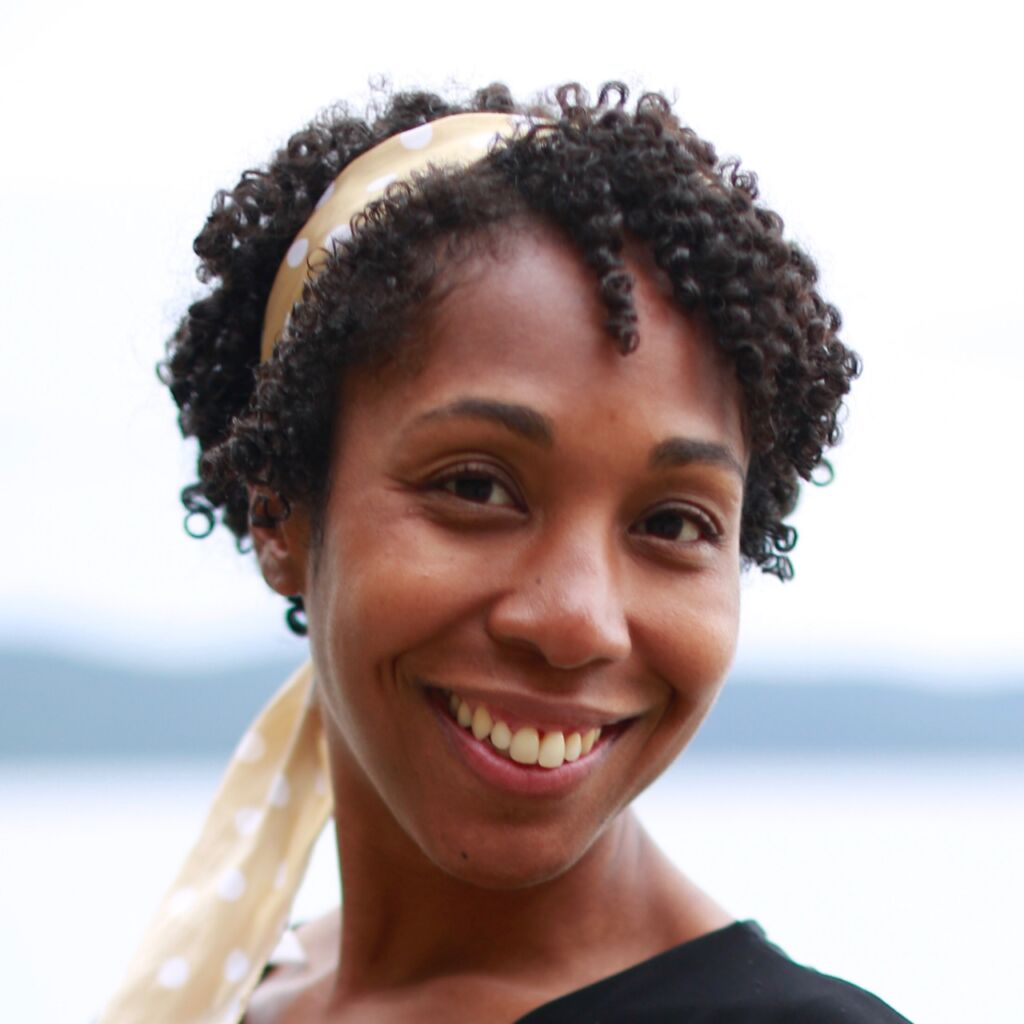
I think the people who show up in business school, particularly those doing projects with WDI, have a desire to make a difference in the world, and that desire is going to follow people. It doesn’t always mean you have to stay in one space doing the same thing.
– Patrice Gopo, author, Autumn Song
That moment, when Gopo was awarded funding from WDI, changed the trajectory of her entire life. It was more than a two-month internship. In South Africa, she saw what real impact efforts look like. She experienced, yet again, how deeply the world is intertwined. In a country far from where she was born, Gopo found a passion, a husband and, eventually, a career.
When she officially moved to South Africa to live with her husband, a Zimbabwean who was studying in the country at the time, she couldn’t work in business.
“I had all these skills. I had an MBA. I had a Master’s of Public Policy. What I didn’t have was a work permit. I wasn’t able to do any of the work I was trained to do at the time, and that’s when I started writing,” Gopo said.
It was a slow grind at first, finding spaces where she could lend her words. Eventually, she started to lean into the topics she knew best: identity, community and global connection.
Her first published work, All the Colors We Will See, dives into questions of intersecting heritages, race relations and complex identities through conversations about marriage, divorce, beauty and faith. Her second, Autumn Song: Essays on Absence, includes personal stories of loss, from dreams left to the wayside to older versions of ourselves who have disappeared. In it, she explores how she’s navigated grief, healing and change. Both compilations are deeply informed by her experience as a woman with intimate global ties.
Her children’s book, All the Places We Call Home, is a story about connection across borders, told through the universal topic of naps. It’s rooted in her own life — and now in the lives of her daughters. In it, a little girl is getting ready for bed with her mother and thinking about all the places around the world where she’s laid down her head to sleep. “I love this book because it’s telling a story that so many people have experienced, but it’s a story that has often been relegated to the margins,” Gopo said. “We don’t necessarily hear about families who have multiple ties to multiple parts of the world — or about the idea that home can feel fluid at times.”
Gopo’s writing is an exercise in togetherness, and it’s the next iteration of a long-held passion for uniting people toward a better future. In telling these stories, she says, “There’s power. There’s legacy. There’s identity. These things make us more confident and content in who we are and in our stories.”
Though her path may have diverted from those typically taken by business students, Gopo doesn’t believe there’s only one way to use the MBA degree. “I think the people who show up in business school, particularly those doing projects with WDI, have a desire to make a difference in the world, and that desire is going to follow people. It doesn’t always mean you have to stay in one space doing the same thing.”
Besides driving her toward her current career and family, Gopo’s time at the U-M taught her three important professional lessons. First, she now takes an active role in how her writing is released to the public. She identifies her target market, considers who would be interested in her stories and determines the value proposition of her work. On top of that, she carries the confidence she gained in Ann Arbor with her. At U-M, she was encouraged to try new things, test out solutions and adapt after lessons. She brings that surety into her writing career, pushing the bounds of her topics and how she reaches people. Finally, at Ross, there was constant encouragement to press on and improve issues of inequity and underdevelopment.
“That all still shows up in my writing because I’m the same person. I’m still a person who cares about what’s happening around me. I am this person who is asking questions and seeking answers, interested in issues of justice and how we think about that,” she said.
Gopo said her U-M and WDI experiences continue to crop up her professional life. The support she felt when she was provided that funding has given her the confidence to apply for more over the years. Gopo recently received a Cultural Vision Grant from the Arts and Science Council of Charlotte Mecklenburg County to implement a local public library program about sharing personal stories. “I created this program to draw people together through community, recognize the things we have in common and see the ways our journeys differ such that we can build greater understanding,” she said. “It may not necessarily be global, but it connects to my goal of empowering people to flourish in their lives.”
Gopo continues to explore the beauty of a multifaceted life through her writing, her podcast Picture Books Are for Grown-Ups Too! and her community work. Her books are available to purchase at Shelves, Main Street Books or Park Road Books.
Author headshot by Allie Marie Smith
Time: 8 AM EDT / 3 PM EAT / 5:30 PM IST
Date: Tuesday, April 16, 2024
Location: Zoom
Private sector innovation is a cornerstone of the efforts to bring clean cooking to the over 2.3 billion people worldwide who presently lack it.
The Clean Cooking Alliance (CCA) has supported over 25 clean cooking companies through its Venture Catalyst program, which helps firms attract investors, and grow their leadership and technical capacity to scale. Supported companies like BioLite, BURN Manufacturing, KOKO Networks and Sistema.bio have brought different product and business strategy innovations to the forefront. These include high-tech solutions like electric induction cookers, new fuels such as ethanol, targeted marketing, and business model solutions such as special purpose financing vehicles, carbon financing, and pay-as-you-go customer financing mechanisms.
The April 16 discussion, “Front Burner: How Business Model Innovation is Driving the Clean Cooking Industry,” will be hosted by the William Davidson Institute at the University of Michigan (WDI), and will feature panelists from CCA and these four trailblazing clean cooking companies with operations in multiple countries. Panelists will share their strategies for growing market size and scale, as well as barriers and enablers to implementing innovation. To learn more about the state of the clean cooking industry, click here for the CCA’s 2023 Annual Report.
WDI is supporting the learning objectives of the Clean Cooking Alliance Market Strengthening Program by developing innovative methods to measure the effectiveness of market strengthening interventions. The Institute is providing programmatic and data support, informing programmatic adaptations and pivots, and contributing to knowledge products targeting clean cooking enterprises, funders, policymakers and other stakeholders.
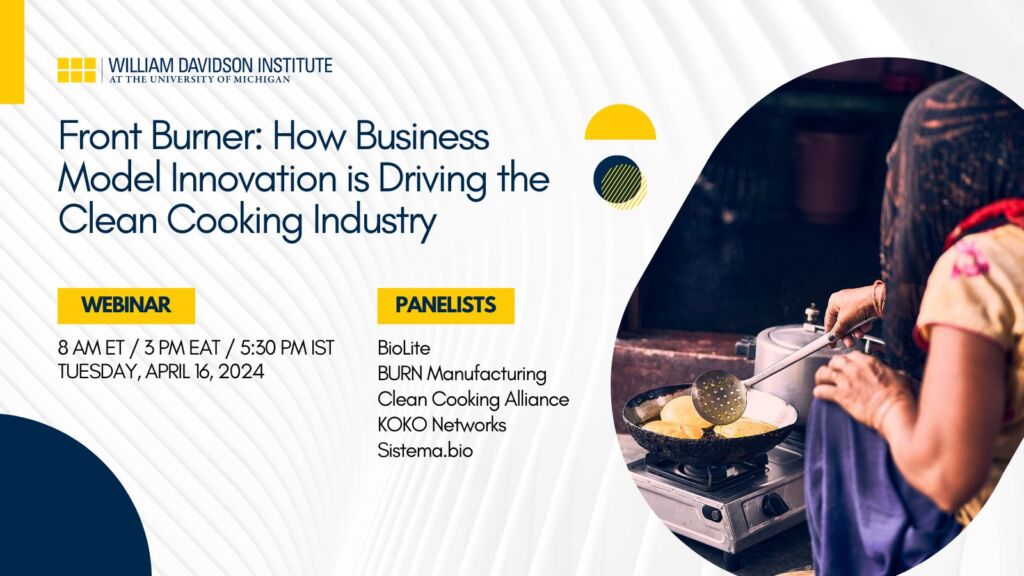
Time: 4 PM EDT
Date: April 3, 2024
Location: Blau Colloquium, 5th floor of the Blau Building at the Ross School of Business
wahu! is the first Ghanaian brand to produce electric vehicles domestically. The electric bike (e-bike) startup brings together local talent and experienced automotive engineers and designers from global automakers, including Audi and BMW.
In the talk, “How an E-Bike Startup is Looking to Change the Way Africa Moves,” Valerie Labi, co-founder and CEO of wahu! Mobility Ltd. will discuss how the business is unlocking new possibilities in low-emission mobility solutions, particularly in urban markets. By locally designing and manufacturing connected EVs for Africa and the wider world, wahu!’s value proposition includes ease of transport, a path to vehicle ownership and a gateway to sustainable employment through mobility services.
Labi is an entrepreneur who also served as Ghana country director for nonprofit iDE, International Development Enterprises, which focuses on market-based solutions in agriculture and water/sanitation. She received her Bachelor of Science degree in Economics from the University of Southampton and her Masters of Studies from the University of Cambridge in Sustainability Leadership.
This event is open to the public and sponsored by the William Davidson Institute at the University of Michigan (WDI) in partnership with the African Studies Center at U-M’s College of Literature, Science, and the Arts.
Attendees are encouraged to register (see below or click here) and submit questions in advance. Light refreshments will be served.
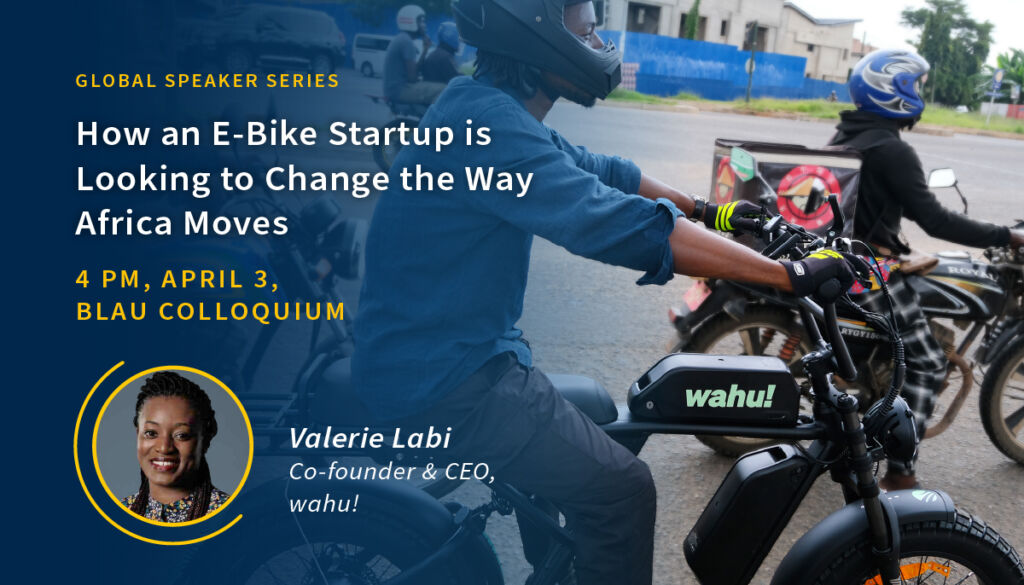
![]()
![]()
Time: 4 p.m., March 7
Location: Corner Commons, first floor of the Blau Building at the Ross School of Business
The William Davidson Institute and the Weiser Center for Europe and Eurasia are proud to present a discussion with Sophia Opatska, Vice Rector for Strategic Development at Ukrainian Catholic University. Opatska, an entrepreneur and an academic, leads University’s Lviv Business School. More than two years after Russia’s invasion of Ukraine, Opatska will explain how business leaders and business educators have persisted toward economic resilience in the face of war.
Through student programs, projects and university partnerships, WDI has worked in Ukraine for more than two decades. Before Russia’s invasion, the Institute sent multiple teams of U-M MBA students to Lviv Business School of Ukrainian Catholic University to assess and make recommendations to improve their consulting process for small- and medium-sized businesses in the country.
This event is open to the public. Attendees are encouraged to register and submit questions in advance. Light refreshments will be served.
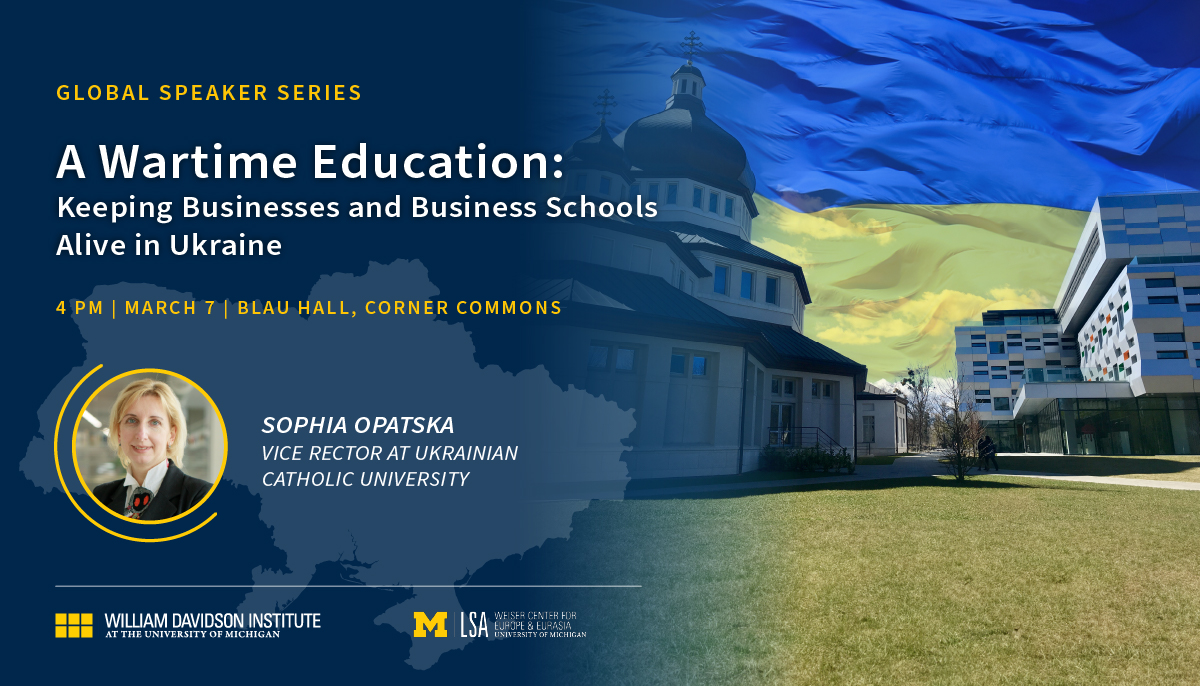
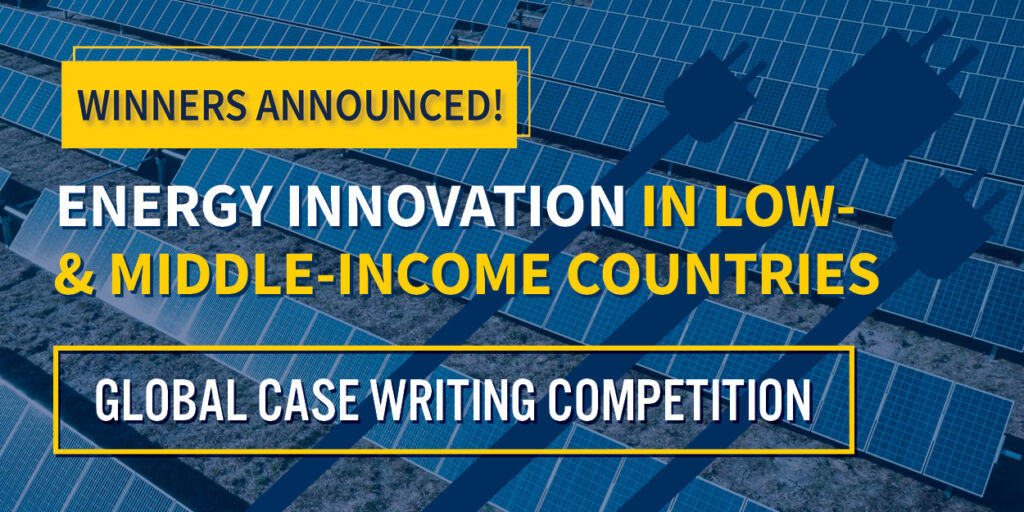
According to the International Renewable Energy Agency, 733 million people are currently living without electricity. Most of those off-grid populations are in low- and middle-income countries (LMICs), often cooking or heating their homes with fuels that are harmful to their health and the environment. At the same time, global investments in renewable energy are at an all-time high, creating a new generation of entrepreneurs and businesses.
It’s in this environment that the William Davidson Institute at the University of Michigan (WDI) launched the Energy Innovation in Low- and Middle-Income Countries Global Case Writing Competition. Administered by WDI Publishing, the contest sought out new voices and expertise in the form of business case studies focused on energy solutions in emerging markets.
Case studies encourage current and future business leaders to expand their education, question their assumptions and discover innovative strategies. The development and use of these cases will help accelerate global understanding of how businesses are implementing energy technologies and innovations in LMICs. The contest received submissions from 10 different countries and 14 universities around the world.
“It was very gratifying to receive submissions from so many different countries and institutions,” said Sandra Draheim, Manager of Case Publishing at WDI. “Clearly the clean energy challenge in LMICs is front and center within many academic institutions and other organizations globally.”
The top three winning cases feature businesses with energy at the heart of their operations, including new approaches to solar and wind energy.
“The energy sector is undergoing an incredible transition and this needs to be reflected in the types of case studies available for students who will be navigating these changes,” said Dana Gorodetsky, WDI Program Manager, Energy. “It’s exciting to see so many dynamic entries for the competition that reflect innovation, creativity and access.”
The energy sector is undergoing an incredible transition and this needs to be reflected in the types of case studies available for students who will be navigating these changes.
Dana Gorodetsky, WDI Program Manager, Energy
First place $3,000
Electric Moto-Taxis Innovation in Low-Income Countries: A Rider’s Perspective in Kampala
When he purchased an electric motorcycle, Sammy Kalunji – a self-employed microentrepreneur in Kampala, Uganda – joined the hundreds of low-emission transportation pioneers in the heavily polluted city at the end of 2022. Despite lower operating costs of the electric vehicle, known as an E-boda, Kalunji does not receive enough income to fully provide for his family. The case elaborates on four financial, operational, commercial, and social organization models and alternatives Kalunji must navigate so that he and his fellow E-boda riders can harness economic opportunities while spurring green urban mobility.
Authors: Nathalie Prime, Professor of International Business & Sustainability and Scientific Director of the Chair Responsible Innovation in Africa at ESCP Business School in France; Akil Amiraly, Associate Researcher at Ecole Polytechnique in France; Mansoureh Hasannia Kolaee, PhD and Post-doctoral Researcher at Laval University in Quebec; Peter Kasaija, Research Associate at Urban Action Lab, Makerere University in Uganda.
Paths to the Future of Solar Energy in Brazil
The case aims to put students in the role of the protagonist Sergio Araújo, CEO of SolarEnergy, to assess the company’s next steps amid the arrival of new investors. SolarEnergy provides installation and maintenance services for photovoltaic panels in regions of Brazil. With shifts in the market and new government tax policies at the beginning of 2023, Araújo faces new market dynamics and challenges as new investors seek to multiply annual revenues by five within five years.
Authors: Eduardo Russo, Post-doctoral Researcher Coppead Graduate School of Business, Federal University of Rio de Janeiro; Marco Simões-Coelho, Associate Researcher, Coppead Graduate School of Business; Ariane Roder Figueira, Associate Professor at Coppead.
Gigawatt Global: Electricity in Africa Fueled by the Power of Purpose
Gigawatt Global Coöperatief U.A., a multinational renewable energy company focused on the development and management of utility-scale solar and wind fields in emerging markets, faces a striking dilemma: the firm’s corporate social responsibility (CSR) activities may be limiting its efforts to bring clean energy to Africa. Gigawatt Global’s strategy is to partner with diverse stakeholders — energy financial entities, governments, development groups and other institutions — to structure renewable energy investments in emerging markets. As a mission-driven company, it invests significant resources into CSR efforts alongside each project it completes. The challenge for the company’s chief financial officer is determining the right balance between mission-fulfilling efforts worthy of investment, while also growing and thriving as a business in a market replete with uncertainties. The case presents conditions and potential decisions faced by the company’s chief operating officer trying to find the right balance.
Authors: Sheri Lambert, Associate Professor of Practice at Temple University; James Oldroyd, Associate Professor of Strategy, Brigham Young University; Narasimhan Srinivasan, Associate Professor of Marketing at the University of Connecticut; Lynne Sprugel, Adjunct Instructor of Management, University of Dallas.
Deeana Ahmed, Chief Strategy Officer at Our Next Energy (ONE). Ahmed holds a doctoral degree in neuroscience and nutrition from Columbia University, a Master of Science and Master of Public Health in policy from Tufts University, and a Bachelor of Science from the University of Michigan. Ahmed is a published researcher and policy analyst who has conducted large policy evaluations for the NYC Department of Education, managed grants for a Silicon Valley non-profit, and owns and operates a start-up education technology firm. Ahmed is an alumnus of the University of Michigan Solar Car Team, where she led the development of the nationally and globally ranked solar car, InfiniUM’s battery pack.
Kate Gasparro, Director of Land Development and Sustainability at Bedrock Detroit. Gasparro is responsible for planning and implementing the company’s sustainability and district infrastructure strategies, lowering the carbon footprint of the built environment in Detroit and Cleveland. Gasparro earned a BS in Civil Engineering from Clemson University. She went on to earn an MA in International Policy and PhD in Civil and Environmental Engineering from Stanford University.
Daniel Vermeer, Associate Professor of the Practice; Executive Director, Center for Energy, Development, and the Global Environment at Duke University’s Fuqua School of Business. Vermeer has spent three decades working on the world’s “grand challenges”, including water scarcity, climate change, and ocean sustainability through diverse roles in academia and business. His areas of expertise include sustainable development, business innovation, climate change, water management, and food systems. Prior to Duke, Vermeer led Coca-Cola’s water sustainability initiative and has also worked with leading companies and organizations including Google, Walmart, GE, Tesla, World Wildlife Fund and the UN Global Compact.
About WDI Publishing
WDI Publishing produces and distributes high-quality, cutting-edge business cases and other teaching materials for business schools around the globe with more than 700 cases in its collection reaching 800 universities and institutions around the world. Learn more about the case collection and future competitions at wdi-publishing.com.
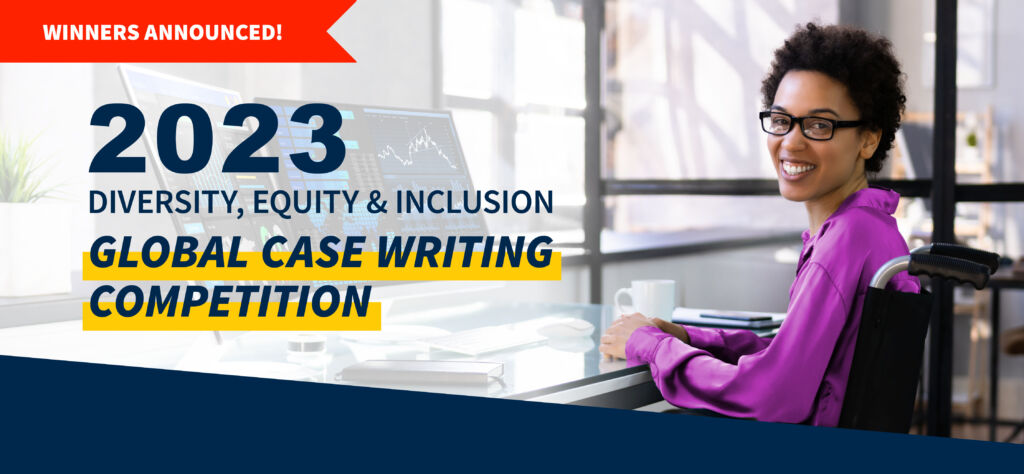
From inclusive hiring practices to gender pay equity, the winners of the 2023 Diversity, Equity & Inclusion Global Case Writing Competition tackled today’s most pressing DEI quandaries.
The 2023 Diversity, Equity & Inclusion Global Case Writing Competition, managed by the William Davidson Institute (WDI) at the University of Michigan generated 26 cases from seven countries. Now in its third year, the contest is supported by the Ross School of Business. The partnership will be renewed with a fourth competition in 2024.
The winners, announced below, represent the best of a strong field of submissions. Authors covered topics ranging from gender pay equity to conflicting DEI-related business practices within an organization. Other topics included equitable restroom access and encouraging employee support of a staff member’s gender-confirming surgery. The vast majority of submissions touched on an immediate and critical business quandary.
By publishing and disseminating the winning cases, WDI Publishing continues to build its collection of valuable teaching tools focused on DEI that provide crucial business lessons to the global economy, including to low- and middle-income countries.
“The cases we received this year were outstanding, and I was especially impressed by the ability of each submission team to tap into what’s truly going on in the business world when it comes to diversity, equity and inclusion,” said Lori Costew, retired Chief DEI Officer at Ford Motor Company, and finalist judge.
Case studies provide real-world lessons at the core of many business schools, and serve as an opportunity for students to apply the business concepts to their current or future careers. Case studies cover the breadth of topics that business leaders will encounter, including issues of diversity, equity and inclusion.
“In addition to students, these case studies are tools that businesspeople everywhere can use to improve their diversity, equity, and inclusion efforts and overall business success,” said Sandra Draheim, Manager of WDI Publishing.
After sorting through a trove of compelling, thoughtful submissions, contest judges have selected the competition’s 2023 winners.
The cases we received this year were outstanding, and I was especially impressed by the ability of each submission team to tap into what’s truly going on in the business world when it comes to diversity, equity and inclusion.”
Lori Costew, retired Chief DEI Officer at Ford Motor Company
The first-place case, Diversity, Equity, and Inclusion Initiatives at Levi Strauss & Co.: Are They Enough?, asked readers to push the bounds of what can be done in an organization around diversity, equity, and inclusion. Writer Hadiya Faheem and Associate Dean Sanjib Dutta at the ICFAI Business School in India, wrote about Levi Strauss & Co.’s efforts to increase the number of women and people of color in senior positions. While the company already maintained a diverse workforce, it hired a Chief Diversity, Inclusion & Belonging Officer to build a more diverse talent pipeline for these higher-level roles. The case calls on readers to consider how an organization can expand on the current expectations of DEI initiatives — pushing beyond the checkboxes that can sometimes come along with these commitments.
The second-place case, Rhino Foods’ People-Profit Dilemma: Inclusive Workforce Challenges and Opportunities, brought to the surface a conversation about inclusive hiring. Authors Pramodita Sharma, Srinivas Venugopal, and Nicole Mallett from the University of Vermont’s Grossman School of Business shared the story of Rhino Foods, the food ingredients supplier that manufactures the “cookie dough” in Ben & Jerry’s ice cream. Since its establishment in 1981, the company has followed an inclusive hiring policy, and 40% of its current employees arrived through refugee resettlement programs before becoming U.S. citizens. They also recruit people coming out of incarceration, homelessness and rehabilitation for substance abuse. The policy to not run background checks on potential employees removes barriers to entry for employment — and expands its inclusivity. However, cultural adjustments required updated training materials, flexible scheduling and support for current team members. The case asks readers to consider what actions Rhino Foods could take to support its diversity and inclusion goals while alleviating stressors for current employees.
The third-place case tackled the question of gender pay equity — an issue that has been at the top of mind in the business world for decades but has not yet been resolved. Authors Christopher I. Rider, Elizabeth Choi, and Yena Kim from the University of Michigan present a fictional business scenario where the average pay for men and women employees is not significantly different. Still, staff observations did not align with that analysis. The case, The Quest for Gender Pay Equity at Elemental Systems, pushes readers to consider how to reconcile perceptions and data. This case will be published in October.
The finalist cases were reviewed by a team of distinguished judges well connected in the DEI and case publishing worlds: Lori Costew, retired Chief DEI Officer at Ford Motor Company; Shaista Khilji, Professor of Human and Organizational Learning and International Affairs at George Washington University; Manel Khadraoui, Associate Professor of Marketing at University of Tunis Business School; Kim Eric Bettcher, Director, Policy and Program Learning at the Center for International Private Enterprise; John Lafkas, Senior Editor, Cases & Pedagogy at Harvard Business Publishing; and Greg Merkley, Director of Case Publishing at Northwestern University Kellogg School of Management.
“The submissions were themselves diverse — in terms of topics and issues,” said Draheim. “In addition to university faculty, there were many graduate and undergraduate students, research assistants, and businesspeople who submitted, which was impressive. Often having input from business leaders makes a case stronger and more realistic.”
Judges also awarded two honorable mentions. Breaking Bread: DEIB Challenges Impact a Peruvian Corporation’s Potential asks readers to identify and attempt to resolve issues arising from a competitor merger that created serious diversity, equity, inclusion, and belonging concerns. Diversity on Screen: Allure Studio’s Challenging Casting Decision explores how the entertainment industry, specifically in casting, must grapple with issues of diversity and inclusion.
The first-place winners received $10,000, second-place winners received $5,000, and third-place winners received $2,500, funded by Michigan Ross.
“Our investment in the 2023 Diversity, Equity & Inclusion Global Case Writing Competition demonstrates our tremendous commitment to this important practice at the Ross School of Business,” said Carolyn Yoon, associate Dean for Diversity, Equity & Inclusion at Michigan Ross. “We are proud to have supported the competition into its third year and look forward to its growth.”
Each one of the case studies provides a unique look into the growing questions around diversity, equity, and inclusion in business — and WDI has been dedicated to expanding educational tools for students and professionals on these topics. Winning cases this year and in previous years have honed in on timely topics that any business interested in improving DEI efforts would benefit from thoughtfully contemplating. Cases from recent competitions have already been adopted and taught at universities around the globe.
About WDI
At the William Davidson Institute at the University of Michigan, unlocking the power of business to provide lasting economic and social prosperity in low- and middle-income countries (LMICs) is in our DNA. We gather the data, develop new models, test concepts and collaborate with partners to find real solutions that lead to new opportunities. This is what we mean by Solving for Business — our calling since the Institute was first founded as an independent nonprofit educational organization in 1992. We believe societies that empower individuals with the tools and skills to excel in business, in turn generate both economic growth and social freedom — or the agency necessary for people to thrive.
